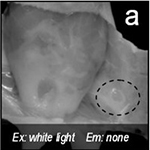Intravital spectral imaging as a tool for accurate measurement of vascularization in mice
Main Article Content
Abstract
Background
Quantitative determination of the development of new blood vessels is crucial for our understanding of the progression of several diseases, including cancer. However, in most cases a high throughput technique that is simple, accurate, user-independent and cost-effective for small animal imaging is not available.Methods
In this work we present a simple approach based on spectral imaging to increase the contrast between vessels and surrounding tissue, enabling accurate determination of the blood vessel area. This approach is put to test with a 4T1 breast cancer murine in vivomodel and validated with histological and microvessel density analysis.
Results
We found that one can accurately measure the vascularization area by using excitation/emission filter pairs which enhance the surrounding tissue's autofluorescence, significantly increasing the contrast between surrounding tissue and blood vessels. Additionally, we found excellent correlation between this technique and histological and microvessel density analysis.Conclusions
Making use of spectral imaging techniques we have shown that it is possible to accurately determine blood vessel volume intra-vitally. We believe that due to the low cost, accuracy, user-independence and simplicity of this technique, it will be of great value in those cases where in vivoquantitative information is necessary.
Article Details
How to Cite
ARRANZ, Alicia et al.
Intravital spectral imaging as a tool for accurate measurement of vascularization in mice.
Vascular Cell, [S.l.], v. 2, n. 1, p. 22, oct. 2010.
ISSN 2045-824X.
Available at: <https://vascularcell.com/index.php/vc/article/view/10.1186-2040-2384-2-22>. Date accessed: 12 feb. 2026.
doi: http://dx.doi.org/10.1186/2040-2384-2-22.
Section
Methodology and Protocols

